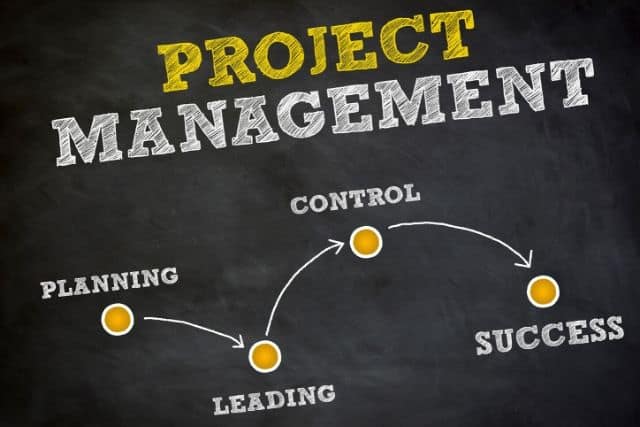Generally speaking, the project is a limited duration project (referring to an activity) Aims to create a unique product, commodity or service, or produce an innovative result. Based on this definition, project management should be understood as applying knowledge, effort and expertise, tools and techniques to project activities to meet project requirements. On this basis, project management deserves a well-defined structure, to avoid frustration and low productivity levels, it is necessary in project management to determine its stages very well.
What are the five stages of project management? This is what we invite you to learn about through our following article:

What is project management?
Project management As we indicated at the beginning, is the application of processes, methods, skills and knowledge, experience to achieve the project's specific objectives, according to the project acceptance criteria within the agreed criteria, project management has final outputs restricted by time scale and limited budget.
The main factor that distinguishes project management from "management" only is that project management contains final delivery and a limited duration of time, unlike management in general, which is an ongoing process, which is why the project professional needs a wide range of skills; Often technical skills, certainly people management skills and good business awareness, to manage a successful project, this is what is offered by the fekrait Software Foundation through a set of programs and systems that serve most government and private projects.
Five phases of project management
The project management process is usually divided into separate phases, taking the project from start to finish, these phases include:
- Initiative
- Planning
- Implementation
- Monitoring and surveillance
- Closure
These phases often overlap with the project's life cycle, which can help you determine the correct flow and sequence of operations to finish your project. Our project management checklist can help you split tasks for each project phase, as follows:
1. Initiative
The initiative is the official start in project management, usually starting with the issue of project delegation, which briefly describes its purpose and authorizes budget expenditure.
At this stage, the project must be determined at a large level. This often starts with:
- Feasibility study - justification of project need and assessment of potential benefits
- Feasibility study - assessing the problem and determining whether the project will solve it
If you decide to implement the project, you must then create a project start-up document (PID), this is the basis for project management, and an important reference point for the following stages, the main components should be:
- Your Business Status
- Project objectives, scope and size
- Project organization (identification of "who, why, what, when and how" of the project)
- Restrictions
- Risks
- Actors
- Project controls and reporting framework
- Closure and evaluation criteria
2. Planning
Once the project has been approved based on the work status, the work statement or the project start document, you can now move to the planning phase of the project management.
At this stage of the project management life cycle, you can divide the overall project into smaller tasks, build your team, prepare a timetable to complete tasks, set smaller targets within the project as a whole, and make sure they can be achieved within the specified time frame. Smaller goals have a greater likelihood of success.
Project management steps in the planning phase
The project planning phase may include the following steps:
Establishment of a project plan
The project's timetable, including phases, tasks to be undertaken and potential constraints, is set out.
Establishment of workflows
Visualize processes using hallways to make sure your team members clearly understand their role in project management.
Establishment of a financial plan
Use cost estimates to determine how much will be spent on the project and get the biggest return on investment.
Pooling of resources
Assemble the career team with internal and external talent groups
Risk Forecast
Identify problems that may cause the project to stall while planning to minimize risks, maintain project quality and meet schedule.
3. Project launch and implementation
Implementation (also called project implementation) simply means putting your project plan into action, often starting with an "introductory meeting" of the project.
During this phase in project management, you will carry out tasks and activities from your project plan to produce its output, for example, if you are creating a promotional package for a trade show, early deliveries may be to collect information about the product and its prices, complete all photographs of your product and get the customer's signature.
Project Managers at Fekrait Software Company with expertise in the implementation of government and private projects, by guiding this work through:
- Supervising the team
- Budget and resource management
- Communicate with stakeholders
4. Project control and control
Monitoring and control often overlap with implementation in project management as they often occur at the same time, they require measuring project progress and performance, and dealing with any issues arising from daily work.
You can use key performance indicators (KPIs) to determine whether your project management is on track, including things you can measure, for example:
- If your project is on time and budget
- If specific tasks are completed
- If the issues are adequately addressed
During this time, you may need to adjust tables and resources to ensure your project remains on track.
Accurate monitoring and control at this point in project management, can help you keep the project plan on track, you can use a set of tools and processes to help you manage things like time, cost, quality and risk, or to inform progress and manage customer acceptance.
5. Project closure
During this last phase of project management, you will complete your business and solve the project, and closing does not necessarily mean success, but simply the last point of the project - for example, closing can occur when projects that fail are cancelled.
Project closure often includes things like:
- Delivery of outputs
- Release of staff and resources
- Archive or deliver any relevant project documents
- Cancellation of suppliers' contracts
- Completion of all activities throughout the project
- Preparation of the final project budget and report
- Delivery to business as usual if this applies after lockdown.
You can perform a review of a post-implementation project (sometimes referred to as a "post-mortem" meeting), this is an opportunity to assess what went well and unless it went well, and understanding failures, if any, can help you learn lessons and improve the way future projects are implemented.
Conclusion:
As an owner or manager of a company, regardless of its size and business line, it is important to be involved in the front line of project management, participation in decision-making and other key aspects, project management is a key aspect of any business, especially for those who hope to expand and are constantly looking for improved operation.
Topics:
reference
1. <<Stages of a project life cycle>>، bedfordviewedenvalenews
2. <<enterprise project management>>, techtarget

Comments
20 Jul 2023 02:48 PM
talent
بارك الله فيك
20 Jul 2023 02:49 PM
yousifsaad
شكرا لك اوجزت واختصرت
20 Jul 2023 02:51 PM
محمد
طيب تحليل المشاريع هل مهاره ضمن ادارة المشاريع
Add New Comment